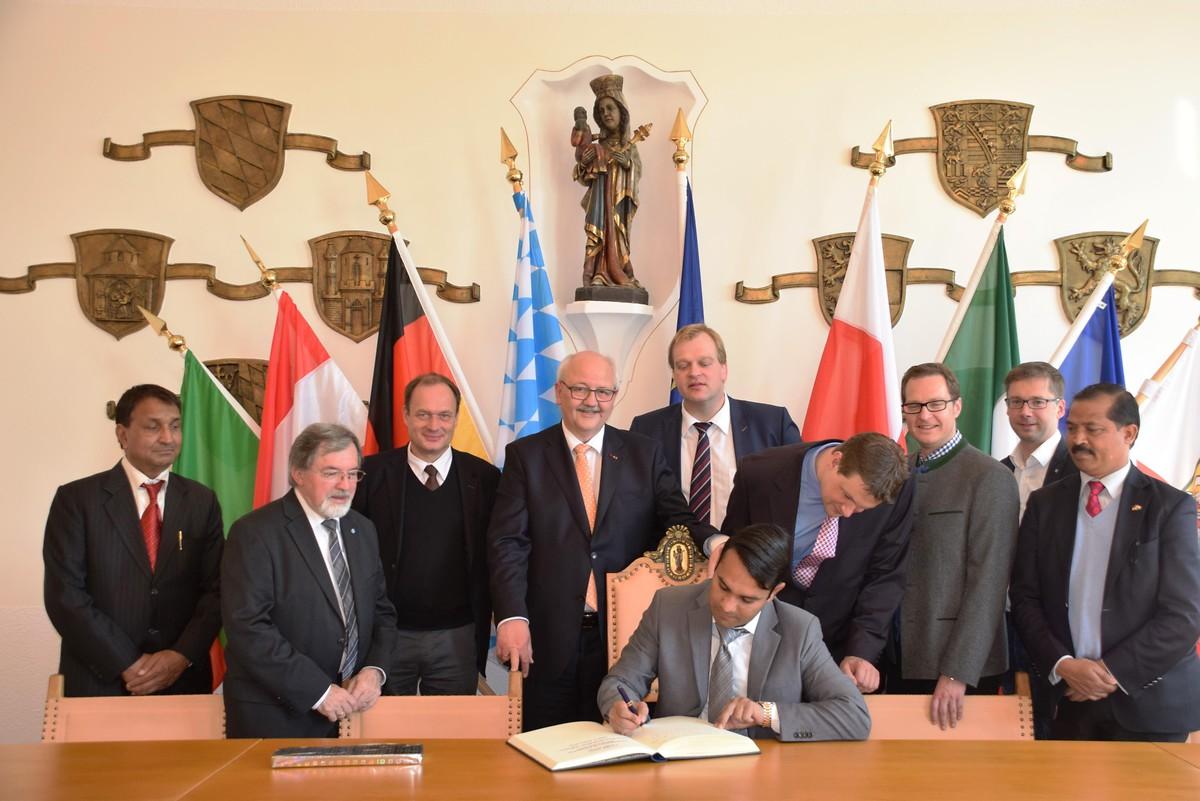Event reports
The 2016 Annual Meeting of the ADB came at a time when ADB was in the process of finalising its new corporate strategy – Strategy 2030 – based on findings and lessons from the recent thematic, corporate, country, and project evaluations. The meeting focused on, besides many important facets of international cooperation, key issues like inclusive and sustainable growth, climate change and resilience as well as governance and institutions.
For this event, the India office of the Konrad-Adenauer-Stiftung e.V. mounted a delegation to Germany comprising of politicians and economic experts. Members of the delegation were Dr. Anirban Ganguly, Director of BJP think tank Dr. Syama Prasad Mookerjee Research Foundation, M. M. Pallam Raju, Member of the Indian National Congress (INC) and former Union Minister for Human Resource Development as well as former Minister of State for Defense, Vincent H. Pala, Member of the Indian Parliament (INC) and former Minister of State for Water Resources (INC), Abhishek Matoria, Member of Legislative Assembly of Rajasthan (BJP), Laxmi Narayan Bairwa, Member of Legislative Assembly of Rajasthan (BJP), Arun Sood, Mayor of Chandigarh (BJP), Mohan Guruswamy, Economist and Chairman of Centre for Policy Alternatives (CPA), Maj. Gen. (Retd.) Dipankar Banerjee, Geo- strategic analyst and Dr. Arvind Virmani, Economist and former advisor to the Indian Government.
The highlight of the visit was the Indian delegation’s meeting with Dr. Angela Merkel, the Chancellor of the Federal Republic of Germany. The delegation also had intense interactions with Dr. Gerd Müller, Federal Minister for Economic Cooperation and Development, Hans-Joachim Fuchtel, the Parliamentary State Secretary in the Federal Ministry for Economic Co-operation and Development (BMZ), Jan Metzler, Johannes Selle and Mark Hauptmann, Members of German Parliament, Steffen Seibert, Government spokesperson, Gurjit Singh, the Indian Ambassador to Germany and also Raveesh Kumar, the Indian Consul General in Frankfurt.
The discussions in Frankfurt acknowledged the ‘India on the move’ phenomenon and Germany’s intention to further broad base and deepen the existing excellent relations between the two democracies. On the anvil are increased institutional, technological and funding support for climate related sectors, vocational training, the textile manufacturing ecosystem, sustainable energy, water management, waste management, digital connectivity. More state-state and city-city cooperation MOUs were envisaged on the lines of Bavaria- Karnataka and Pune- Bremen relationships.
After attending the ADB- Annual Meeting in Frankfurt the delegation visited Berlin, where they met (in chronological order) Dr. Stefan Mair, Member of the Executive Directorate of BDI, Alfons Schneider, Director of Foundation for Family owned Business (Stiftung für Familienunternehmen) in Germany and Europe, Tobias Zech, Member of German Parliament, Ralph Brinkhaus, Member of German Parliament, Deputy head of CDU/CSU in German Parliamentary group and chairman of the German-Indian parliamentarian group in German Parliament and Christian Hirte, Member of German Parliament.
The interactions in Berlin on bilateral issues, while underscoring the good chemistry between Mr. Narendra Modi and Dr. Angela Merkel during and after the Hannover fair, raised questions as to the pace of economic reforms, the development of infrastructure for railways, roads, energy and creation of global value chains from the German side with the Indian side categorical in its assurances of the fast pace of reforms in all sectors including labour and tax regimes while predicting Indian economy reaching GDP of 40 trillion US dollars by 2050. On the international front, the debate was about the European narrative with respect to the refugees/migration crises with its extended logistical and legitimacy problems, the financial crisis that Brexit could generate thus adding to the problems created by Portugal, Ireland, Greece and Spain with France also reaching a critical stage due to its reluctance to undertake financial reforms. All these circumstances were contributing to the rise of far-right influences on the political landscape across European Union.
On Thursday the delegation went to Bavaria. In Burghausen, the delegation met Albert Stegemann, Member of German Parliament and Hans Steindl, Mayor of Burghausen, and in Altötting Herbert Hofauer, Mayor of Altötting. The delegation visited the site of Wacker Chemie AG in Burghausen and exchanged experiences with the senior management including Dr. Dieter Gilles, Plant Manager about various processes and environmental conservation steps including waste disposal and also their operations in India. Afterwards the delegation had an interaction with Siegfried Walch in Gstadt, administrator of the District Traunstein. The Delegation’s visit was concluded in Munich.
The discussions in Bavaria continued in the same vein as in Frankfurt and Berlin but with a sharpened focus on solutions specific to the area for the issues relating to welfare system due to changing demography in Germany, vocational training in agriculture, nitrate content in the ground water, waste water treatment, deforestation, fracking technology and refugees. Possibilities of getting skilled and semi-skilled manpower from other parts of the world including India were speculated upon in the sectors of agriculture, general industry and SMEs as well as that of bringing a German delegation to India from the sector of agriculture to explore opportunities for cooperation.
The visit of delegation was an important step forward in building further on the cooperation at various federal levels while synergising the commonalities and accommodating the diversities of Germany and India. It went a long way towards bringing the ideas generated through talks closer to action on the ground. The visit highlighted the importance of people-to-people contact in forging and strengthening macro level relationships underpinned by micro level contacts. Hence, as a stakeholder, it is the endeavour of the India office of KAS to intensify its focus on these dialogues, be it in India or in Germany or any other international platform, so as to contribute to the constantly evolving Indo-German relations in a robust and positive way.











